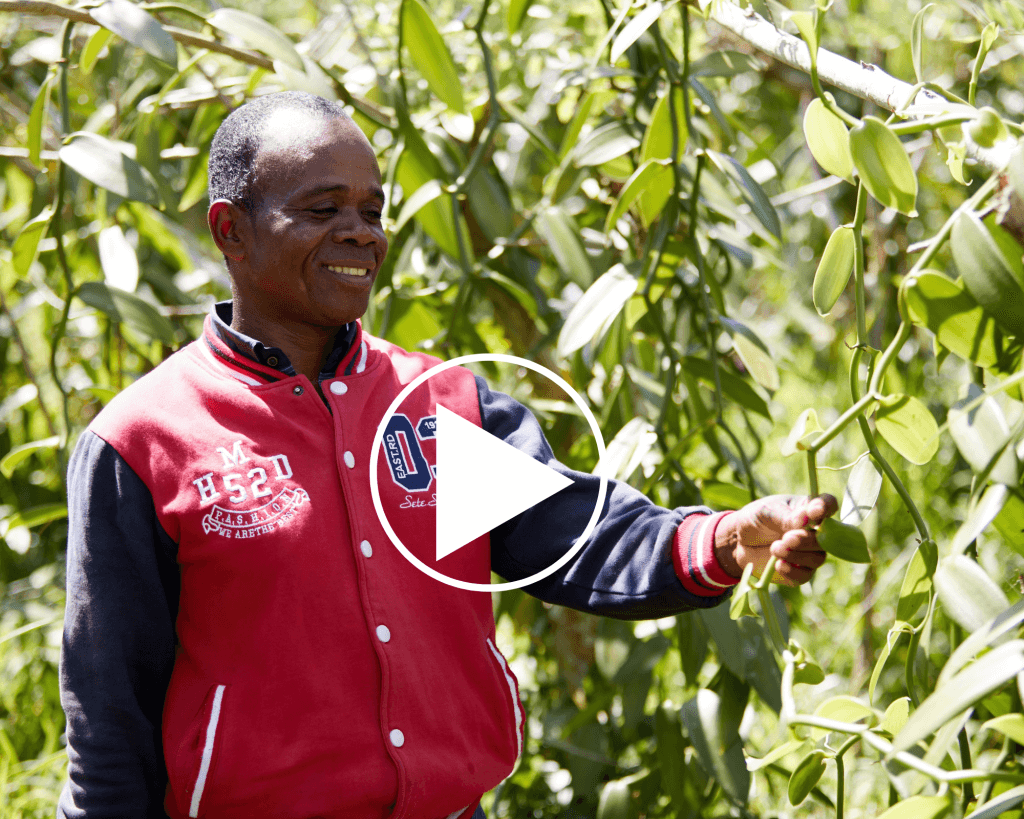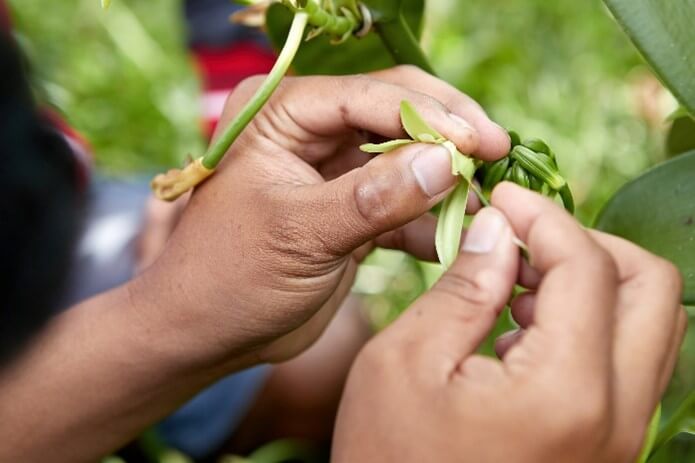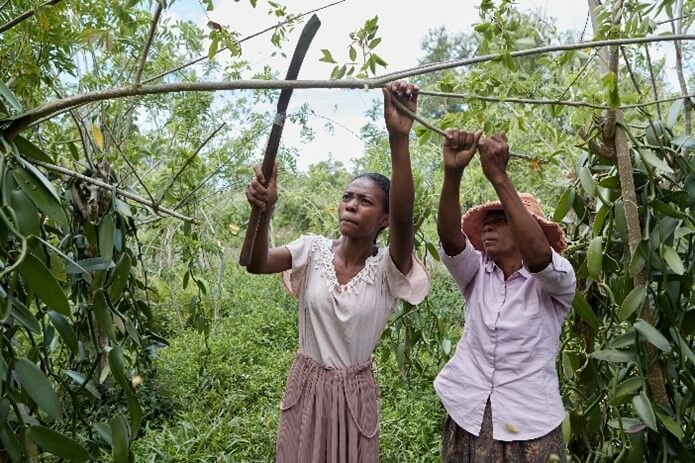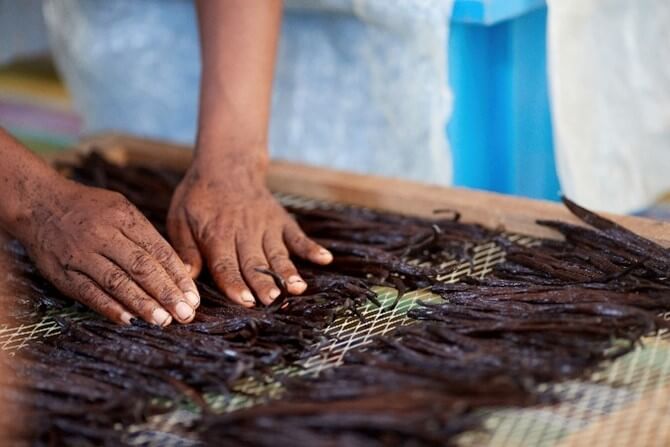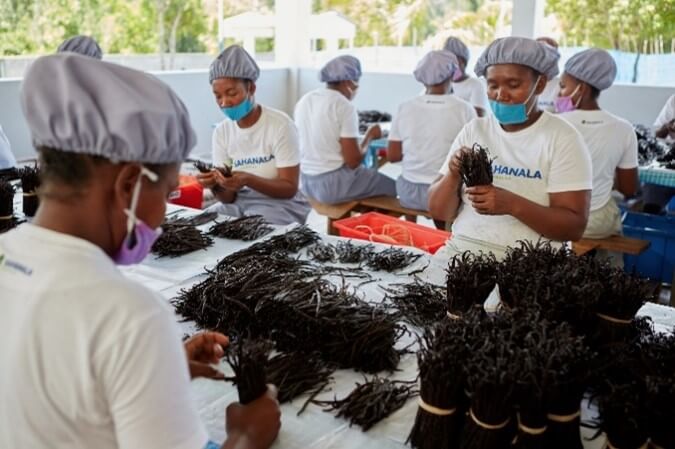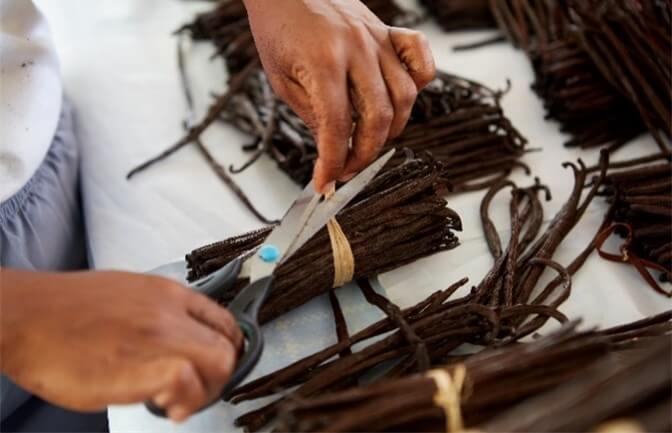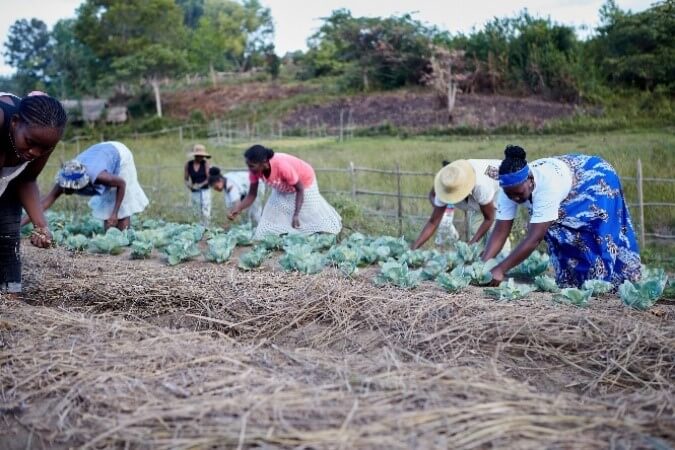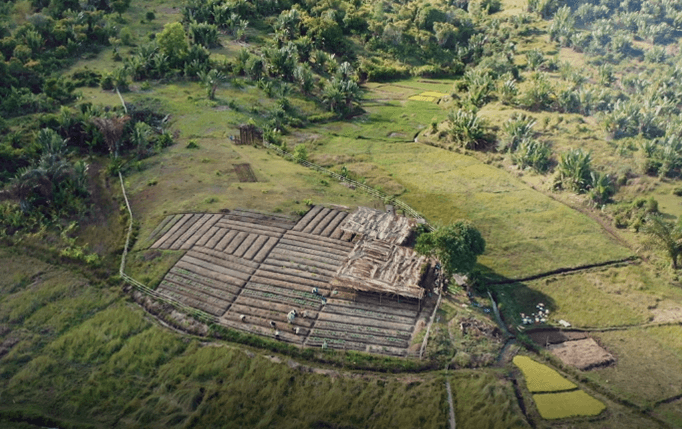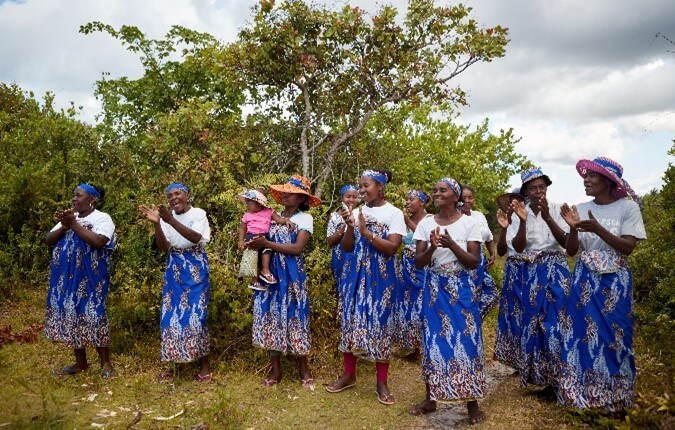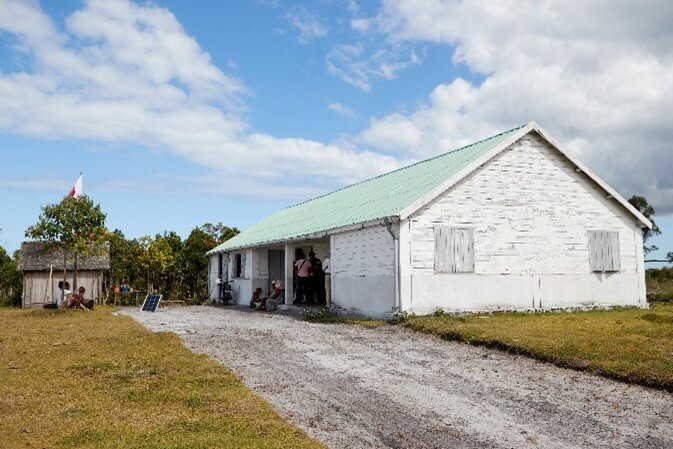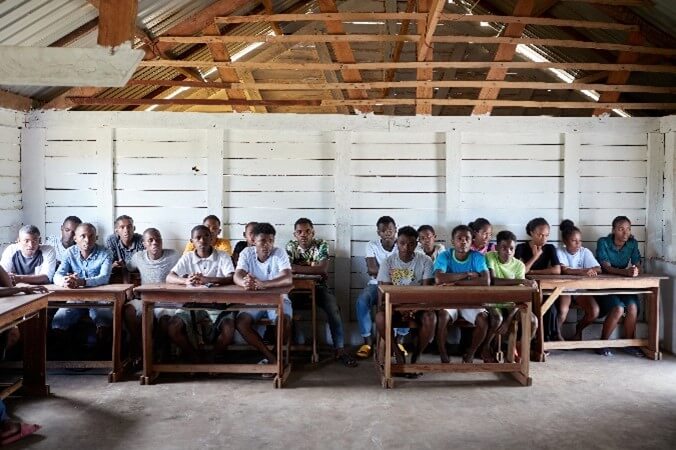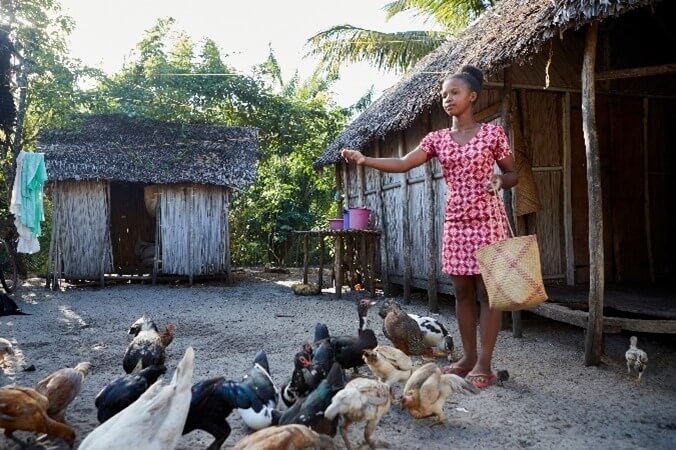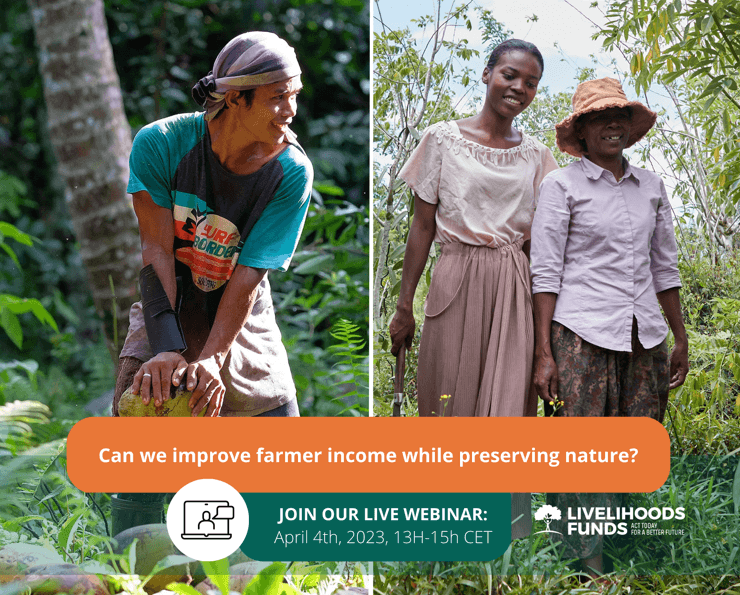Widely used in the food industry (biscuits, ice cream, bread or as a food flavor) vanilla is also famous in the perfume and aromatherapy industries. With its unique taste and smell, vanilla is also known as “green gold” for its high economic value. But the paradox is, in Madagascar which contributes to more than 50% of the world’s vanilla production [1] the smallholders who produce it are far from earning “gold”. The vanilla industry has historically suffered from strong speculation, high theft rates in the field and at times predatory behaviors among some intermediaries. Smallholders’ income was further affected by the lack of efficient practices to optimise their farms productivity or vanilla quality.
With the ambition to reverse this poverty cycle, the Livelihoods fund for Family Farming (L3F) has partnered with actors of the private and public sector, involved at every step of the value chain. Their joint ambition? Support 2,700 vanilla smallholders over 10 years to produce high-quality vanilla, increase farmer income and preserve the farms’ surrounding natural ecosystems. An ambition brought into action by local NGO Fanamby, an experienced organisation working in conservation with vanilla farmers. All partner investors of Livelihoods, Danone, Mars and Firmenich have committed to purchase the project’s vanilla production over 10 years.
What has changed for the farmers 6 years later? Has their income improved alongside with vanilla quality and volume? What is the impact of the project on the local natural ecosystems? Livelihoods is publishing a video of the project with testimonies from farmers showing what has changed for their livelihoods and environment to date and what are their hopes for the future (link to the video).
“We had a lot of vanilla plants, but the production was random. In fact, I used to grow vanilla, without knowing where I was going. I knew we could make money with vanilla, but I did not know how to do it”. Raphael Théogène, vanilla farmer in Madagascar
Livelihoods’ vanilla project at a glance
A coalition of actors at every step of the value chain committed for farmers & nature
Through its Livelihoods Fund for Family Farming (L3F), Livelihoods has pre-financed the project activities and gathered a coalition of farmers, businesses, NGOs and public institutions . Danone, Firmenich and Mars have committed to purchase the vanilla produced in the project area for 10 years. The activities are implemented on the ground by Fanamby, a Madagascan NGO but also, Missouri Botanical Garden, a biodiversity conservation NGO and Maisons Familiales Rurales, an educational association. The project is implemented in the district of Soanierana Ivongo, in Analanjirofo region (north-eastern part of the island).
The project economic activities are co-financed by the French Development Agency (AFD), a French bilateral development agency. The French Facility for Global Environment (FFEM) is also involved to support biodiversity preservation in Pointe à Larrée. This facility implements sustainable development projects that integrate the preservation of public goods, international solidarity, and innovation in developing and emerging countries.
Increase farm productivity through efficient & improved agricultural practices
The first initiative of the project was to help farmers increase the size of their vanilla fields and yields thanks to an adapted agroforestry model. On the one hand, smallholders were provided with new vanilla vines coming from project nurseries and selected partners. On the other hand, farmers were provided with specific trainings to acquire the technical skills that producing high-quality vanilla requires. All farmers entered a training cycle based on three major steps to increase yields and quality: they were trained on pollination (they learned how to pollinate the right number of flowers to reach the longest possible pods), field management (farmers acquired the skills to maintain their fields clean as vanilla vines are highly sensitive to surrounding plants, weeds, and soil coverage) and collection process. These activities were designed so that more women and youth can be integrated in vanilla production than would have been the case in the absence of the project.
To date, all 2,700 farmers involved in the project have received trainings to adopt regenerative agricultural practices, including 550 women. Thanks to the 300,000 vanilla vines distributed to the farmers and the trainings they received, the volumes of green vanilla produced have been multiplied by 3 in average since the project launch. Volumes will continue to grow as recently planted vines are starting to produce, thus generating more income, the objective is to multiply the production by 5 from 2022 to 2027.
A farmer-owned company to create a direct link between farmers and the market
A key lever activated by the project to support farmer income was to help the farmers directly access the market (most of the Malagasy vanilla production is exported). “Tambatra”, is the farmer-owned company that has been structured by the project partners, to remove intermediaries and help farmers earn more out of their production. 20 farmer associations have been created to date: each one of the associations located in the villages Manompana, Antanifotsy, Ambodiampana and Fotsialanana is responsible to collect green vanilla beans and pay the farmers directly. A newly created preparation unit is responsible for the preparation and export of vanilla produced by the smallholders. This structure receives the green vanilla produced by the farmers and ensures the curing process (the green beans are cleaned, sorted, dried, and graded for their quality – this curing process takes up to 6 months).
Coming along with a commercial structure, Tambatra is ensuring full traceability of vanilla, from farm to industry and evaluates the quality before export. The financial margin of cured vanilla sales goes back to the farmers and the community with direct distribution, contributing to increase their revenues and indirect distribution such as extension of vines nursery, investments in the company, access to subsidized rice and agronomic support to farmers and organizational support to associations.
A 10-year purchasing commitment & a floor price to limit the impact of market collapse
The vanilla industry in Madagascar has historically been exposed to strong price fluctuations. Since the project launch in 2017, the vanilla price has dropped by 3.5, after having increased in the previous years. To protect farmers of the project, all partners involved have decided to apply a floor price for the green vanilla produced. Convinced that the structuring of the supply chain takes long-term efforts, Mars (well-known American brand for food, confectionary and pet care products), Danone (major French food brand) and Firmenich (the world’s largest privately owned perfume and flavor company) have committed to purchase 100% of the vanilla produced by the project farmers over 10 years.
To transform the project into a resilient, long-term supply chain, Tambatra, with Livelihoods support, will need to engage and re-engage buyers over the long term to purchase this high social and ecological value vanilla. This is a key element for the sustainability of this farm-owned company.
Diversifying crops to support food security
With vanilla accounting for 40% of the farmer households’ income, the project is now integrating new food crops to support farm diversification and contribute to food security. Although food security remains a challenge in the project area and Madagascar in general, women farmer groups in the project area are now managing kitchen gardens to contribute to reduce malnutrition. They grow various vegetables to feed their families or to be sold to the local markets to support household income.
Food diversification is also part of the training programme addressed to the young generation of farmers. In partnership with Maisons Familiales Rurales, a local educational NGO, the project has opened a training centre dedicated to preparing young farmers for vanilla production but also for new farming activities such as crop diversification, clove production or poultry farming. In December 2021, the training centre celebrated its first graduates.
Within the project activities, a farming school was opened to prepare the young generation of vanilla farmers.
Politina Rasoamalala is a young graduate of the project’s training centre.
Preserving 2,700 hectares of local biodiversity in Pointe à Larrée protected area
From technical skills to produce more and better-quality vanilla, to vine distribution, crop diversification efforts and a new, committed supply chain to link the farmers directly to the market, the project has activated a range of levers to support farmer income. Alongside these efforts, comes a core initiative of the project, which is to preserve 2,700 hectares of biodiversity in Pointe à Larrée, a natural protected area located around the district of Soanierana Ivongo.
The project is putting in place a community-based governance to manage conservation activities, apply biodiversity protection laws, and plant native tree species to prevent the area from natural disasters. With smallholders earning more out of their own farms, the incentive to be involved into destructive activities in the forest is decreasing. Watch at the project’s video and have a glance at impressive Pointe à Larrée, which is also lemurs’ natural habitat.
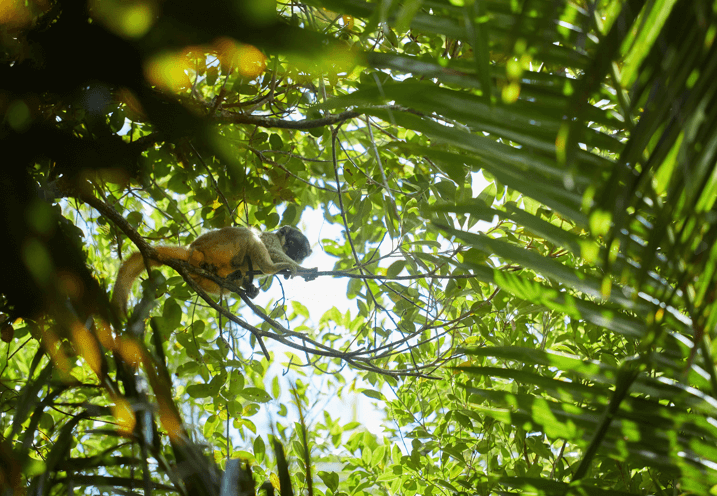
JOIN THE WEBINAR ON APRIL 4th
On April 4th, at 13H00-15H00 CET, we are holding an unprecedented webinar to answer the question: “Can we improve farmer income while preserving nature?” We will share the key learnings, analyse the success factors we are observing to date (6 years after the projects’ launch), but also the challenges that come along with transforming supply chains at scale. The webinar will focus on Livelihoods’ 10-year coconut project in the Philippines, and vanilla project in Madagascar. We will give the floor to our local partners, representatives from the private and the public sector, who act daily to sustainably transform both supply chains.
[1] Madagascar produced 3,070 tons of vanilla in 2021 according to the Food & Agriculture Organization



